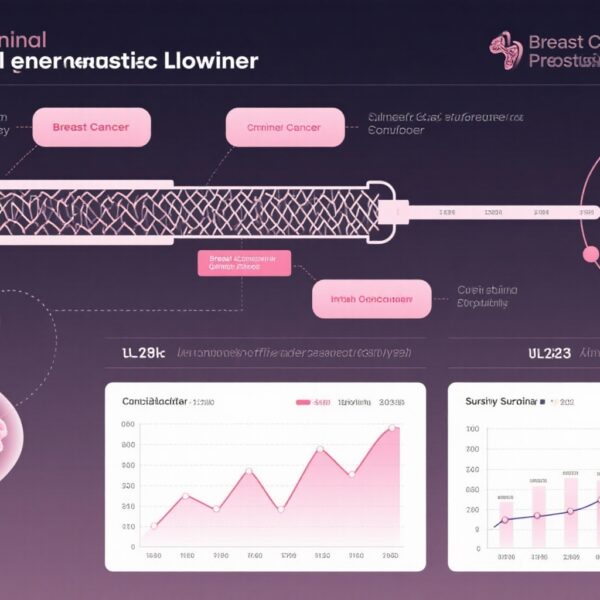Highlight
– Retifanlimab combined with platinum-based chemotherapy significantly extends overall survival in first-line metastatic non-small-cell lung cancer (NSCLC) compared to chemotherapy alone.
– The study included both non-squamous and squamous histologies, with survival benefits consistent across subtypes.
– Safety profile of retifanlimab plus chemotherapy aligns with known effects of PD-1/PD-L1 inhibitors, with manageable treatment-emergent adverse events.
– Retifanlimab represents a potential new immunotherapeutic option expanding access to checkpoint inhibition in metastatic NSCLC.
Study Background
Non-small-cell lung cancer (NSCLC) accounts for approximately 85% of lung cancers globally and remains a leading cause of cancer mortality. Metastatic NSCLC is typically incurable, and systemic therapy aims to prolong survival while maintaining quality of life. In recent years, immune checkpoint inhibitors targeting programmed cell death protein 1 (PD-1) or its ligand PD-L1 combined with chemotherapy have revolutionized first-line treatment paradigms, improving overall survival (OS). Despite this, accessibility to such therapies is inconsistent across regions due to regulatory and economic factors, underscoring the need to evaluate new agents broadening treatment options.
Retifanlimab is a humanized PD-1 inhibitor that has demonstrated preliminary safety and activity signals in NSCLC. The phase 3 POD1UM-304 trial was designed to compare retifanlimab plus standard platinum-based chemotherapy versus placebo plus chemotherapy in treatment-naive patients with metastatic squamous or non-squamous NSCLC.
Study Design
POD1UM-304 was a phase 3, multiregional, randomized, double-blind, placebo-controlled trial conducted across approximately 124 hospitals and private centers in 16 countries. Eligible adults aged 18 years or older had histologically confirmed stage IV NSCLC (both squamous and non-squamous), Eastern Cooperative Oncology Group performance status (ECOG PS) 0 or 1, and no prior systemic treatment for metastatic disease.
Participants were randomized 2:1 to receive either retifanlimab 375 mg or placebo intravenously on day 1 of every 21-day cycle, combined with platinum-based chemotherapy tailored by tumor histology. Non-squamous patients received pemetrexed plus cisplatin or carboplatin for four cycles, followed by maintenance pemetrexed. Squamous histology patients received carboplatin plus paclitaxel or nab-paclitaxel for four cycles without maintenance chemotherapy. Retifanlimab or placebo was administered for up to 35 cycles or until progression, unacceptable toxicity, or consent withdrawal.
Randomization was stratified by PD-L1 tumor proportion score, geographic region, and predominant histology. The primary endpoint was overall survival (OS), defined as time from randomization to death from any cause. Secondary endpoints included safety assessments and evaluation of adverse events.
Key Findings
Between September 2020 and March 2023, 1388 patients were screened, with 583 randomized: 391 patients to retifanlimab plus chemotherapy and 192 to placebo plus chemotherapy. The cohort comprised 381 (65%) patients with non-squamous NSCLC and 202 (35%) with squamous NSCLC. Most patients were male (80%) with a median age of 64 years.
Overall Survival: The median OS was significantly longer in the retifanlimab group versus placebo (18.1 months [95% CI 16.2-21.0] vs 13.4 months [11.0-16.7]). The hazard ratio (HR) for death was 0.75 (95% CI 0.60-0.93; p=0.0042), indicating a 25% reduction in the risk of death with retifanlimab addition.
Safety Profile: Treatment-emergent adverse events (TEAEs) were more frequent in the retifanlimab group, including serious TEAEs (41% vs 30%), grade 3 or higher events (61% vs 54%), and treatment-related dose delays (43% vs 35%). Discontinuations due to adverse events were 8% with retifanlimab versus 5% with placebo. Importantly, fatal COVID-19-related TEAEs were similar between arms (1% vs 3%). The safety profile was consistent with known immune-related and chemotherapy-associated toxicities observed with PD-1/PD-L1 inhibitors combined with chemotherapy.
Histology and Subgroup Findings: The benefit was observed across both squamous and non-squamous histologies and was not restricted by baseline PD-L1 expression, supporting broad applicability. Stratified analyses by geographic region and PD-L1 score confirmed robustness of results.
Expert Commentary
The POD1UM-304 trial adds compelling evidence to the expanding role of PD-1 inhibitors in first-line metastatic NSCLC management. This study uniquely encompasses both key histologic subtypes with rigorous double-blinding and a placebo-controlled design. The observed 4.7-month improvement in median OS with retifanlimab plus chemotherapy aligns favorably with outcomes reported for other approved checkpoint inhibitors, such as pembrolizumab and nivolumab, when combined with chemotherapy in similar populations.
Safety findings reflect expected immune-mediated toxicities and chemotherapy effects but were manageable, suggesting that retifanlimab’s risk-benefit profile is consistent with current standards. Notably, the inclusion of diverse global populations enhances generalizability.
However, further follow-up is warranted to assess long-term survival, quality of life, and potential biomarkers for response optimization. Direct comparative effectiveness studies could clarify retifanlimab’s positioning versus established immunotherapies.
Conclusion
The POD1UM-304 phase 3 study establishes that adding retifanlimab to platinum-based chemotherapy significantly improves overall survival in first-line metastatic NSCLC, encompassing both squamous and non-squamous subtypes. The safety profile is consistent with known effects of PD-1 checkpoint inhibition combined with chemotherapy. Retifanlimab offers a promising therapeutic option, potentially expanding access to effective immunotherapy combinations for patients with advanced NSCLC. Integration into clinical practice should consider comparative efficacy, cost, and regional drug availability. Ongoing research should further clarify patient subsets deriving maximal benefit and long-term outcomes.
Funding and Clinical Trials Registration
This study was funded by Incyte Corporation. The trial is registered at ClinicalTrials.gov with identifier NCT04205812.
Reference
Lu S, Vynnychenko O, Kulyaba Y, Kuchava V, Ibrahim A, Moiseenko F, Arslan C, Nguyen DT, Petrovic M, Cicin I, Bibichadze K, Cil T, Shi J, Olmez OF, Gogishvili M, Artac M, Nguyen HG, Cornfeld M, Tian C, Munteanu MC, Sette CVM, Bondarenko I; POD1UM-304 Study Team. Retifanlimab versus placebo in combination with platinum-based chemotherapy in patients with first-line non-squamous or squamous metastatic non-small-cell lung cancer (POD1UM-304): a phase 3, multiregional, placebo-controlled, double-blind, randomised study. Lancet Respir Med. 2025 Sep 19:S2213-2600(25)00209-7. doi: 10.1016/S2213-2600(25)00209-7. Epub ahead of print. PMID: 40983066.



